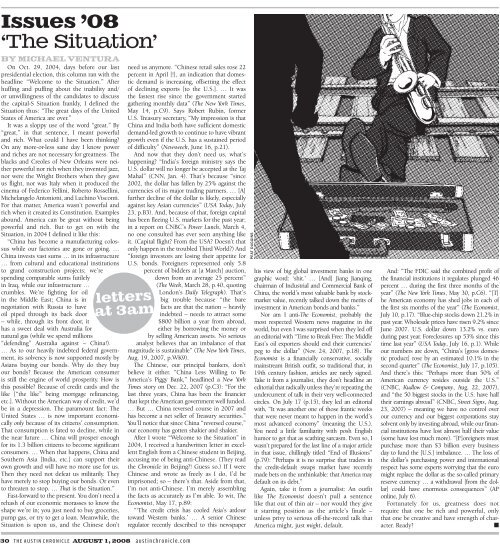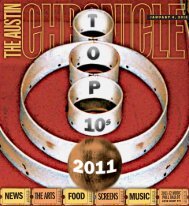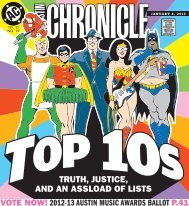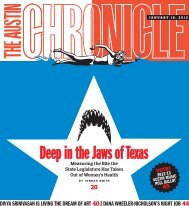Create successful ePaper yourself
Turn your PDF publications into a flip-book with our unique Google optimized e-Paper software.
Issues ’08‘<strong>The</strong> Situation’BY MICHAEL VENTURAOn Oct. 29, 2004, days before our lastpresidential election, this column ran with theheadline “Welcome to the Situation.” Afterhuffing and puffing about the inability and/or unwillingness of the candidates to discussthe capital-S Situation frankly, I defined theSituation thus: “<strong>The</strong> great days of the UnitedStates of America are over.”It was a sloppy use of the word “great.” By“great,” in that sentence, I meant powerfuland rich. What could I have been thinking?On any more-or-less sane day I know powerand riches are not necessary for greatness. <strong>The</strong>blacks and Creoles of New Orleans were neitherpowerful nor rich when they invented jazz,nor were the Wright Brothers when they gaveus flight, nor was Italy when it produced thecinema of Federico Fellini, Roberto Rossellini,Michelangelo Antonioni, and Luchino Visconti.For that matter, America wasn’t powerful andrich when it created its Constitution. Examplesabound. America can be great without beingpowerful and rich. But to get on with theSituation, in 2004 I defined it like this:“China has become a manufacturing colossuswhile our factories are gone or going. …China invests vast sums … in its infrastructure… from cultural and educational institutionsto grand construction projects; we’respending comparable sums futilelyin Iraq, while our infrastructure …crumbles. We’re fighting for oilin the Middle East; China is innegotiation with Russia to haveoil piped through its back door– while, through its front door, ithas a sweet deal with Australia fornatural gas (while we spend millions“defending” Australia against – China!).… As to our heavily indebted federal government,its solvency is now supported mostly byAsians buying our bonds. Why do they buyour bonds? Because the American consumeris still the engine of world prosperity. How isthis possible? Because of credit cards and thelike [“the like” being mortgage refinancing,etc.]. Without the American way of credit, we’dbe in a depression. <strong>The</strong> paramount fact: <strong>The</strong>United States … is now important economicallyonly because of its citizens’ consumption.That consumption is fated to decline, while inthe near future … China will prosper enoughfor its 1.3 billion citizens to become significantconsumers. … When that happens, China andSouthern Asia [India, etc.] can support theirown growth and will have no more use for us.<strong>The</strong>n they need not defeat us militarily. <strong>The</strong>yhave merely to stop buying our bonds. Or evento threaten to stop. … That is the Situation.”Fast-forward to the present. You don’t need arehash of our economic morasses to know theshape we’re in; you just need to buy groceries,pump gas, or try to get a loan. Meanwhile, theSituation is upon us, and the Chinese don’tlettersat 3amneed us anymore. “Chinese retail sales rose 22percent in April [!], an indication that domesticdemand is increasing, offsetting the effectof declining exports [to the U.S.]. … It wasthe fastest rise since the government startedgathering monthly data” (<strong>The</strong> New York Times,May 14, p.C9). Says Robert Rubin, formerU.S. Treasury secretary, “My impression is thatChina and India both have sufficient domesticdemand-led growth to continue to have vibrantgrowth even if the U.S. has a sustained periodof difficulty” (Newsweek, June 16, p.21).And now that they don’t need us, what’shappening? “India’s foreign ministry says theU.S. dollar will no longer be accepted at the TajMahal” (CNN, Jan. 4). That’s because “since2002, the dollar has fallen by 25% against thecurrencies of its major trading partners. … [A]further decline of the dollar is likely, especiallyagainst key Asian currencies” (USA Today, July23, p.B3). And, because of that, foreign capitalhas been fleeing U.S. markets for the past year;in a report on CNBC’s Power Lunch, March 4,no one consulted has ever seen anything likeit. (Capital flight? From the USA? Doesn’t thatonly happen in the troubled Third World?) And“foreign investors are losing their appetite forU.S. bonds. Foreigners represented only 5.8percent of bidders at [a March] auction,down from an average 25 percent”(<strong>The</strong> Week, March 28, p.40, quotingLondon’s Daily Telegraph). That’sbig trouble because “the barefacts are that the nation – heavilyindebted – needs to attract some$800 billion a year from abroad,either by borrowing the money orby selling American assets. No seriousanalyst believes that an imbalance of thatmagnitude is sustainable” (<strong>The</strong> New York Times,<strong>Aug</strong>. 19, 2007, p.WK9).<strong>The</strong> Chinese, our principal bankers, don’tbelieve it either. “China Less Willing to BeAmerica’s Piggy Bank,” headlined a New YorkTimes story on Dec. 22, 2007 (p.C3): “For thelast three years, China has been the financierthat kept the American government well funded.… But … China reversed course in 2007 andhas become a net seller of Treasury securities.”You’ll notice that since China “reversed course,”our economy has gotten shakier and shakier.After I wrote “Welcome to the Situation” in2004, I received a handwritten letter in excellentEnglish from a Chinese student in Beijing,accusing me of being anti-Chinese. (<strong>The</strong>y readthe <strong>Chronicle</strong> in Beijing?! Guess so.) If I wereChinese and wrote as freely as I do, I’d beimprisoned; so – there’s that. Aside from that,I’m not anti-Chinese. I’m merely assemblingthe facts as accurately as I’m able. To wit, <strong>The</strong>Economist, May 17, p.89:“‘<strong>The</strong> credit crisis has cooled Asia’s ardourtoward Western banks.’ … A senior Chineseregulator recently described to this newspaperPEAT DUGGINShis view of big global investment banks in onegraphic word: ‘shit.’ … [And] Jiang Jianqing,chairman of Industrial and Commercial Bank ofChina, the world’s most valuable bank by stockmarketvalue, recently talked down the merits ofinvestment in American bonds and banks.”Nor am I anti-<strong>The</strong> Economist, probably themost respected Western news magazine in theworld, but even I was surprised when they led offan editorial with “Time to Break Free: <strong>The</strong> MiddleEast’s oil exporters should end their currencies’peg to the dollar” (Nov. 24, 2007, p.18). <strong>The</strong>Economist is a financially conservative, sociallymainstream British outfit, so traditional that, in19th century fashion, articles are rarely signed.Take it from a journalist, they don’t headline aneditorial that radically unless they’re repeating theundercurrent of talk in their very well-connectedcircles. On July 17 (p.15), they led an editorialwith, “It was another one of those frantic weeksthat were never meant to happen in the world’smost advanced economy” (meaning the U.S.).You need a little familiarity with posh Englishhumor to get that as scathing sarcasm. Even so, Iwasn’t prepared for the last line of a major articlein that issue, chillingly titled “End of Illusions”(p.79): “Perhaps it is no surprise that traders inthe credit-default swaps market have recentlymade bets on the unthinkable: that America maydefault on its debt.”Again, take it from a journalist: An outfitlike <strong>The</strong> Economist doesn’t pull a sentencelike that out of thin air – nor would they giveit starring position as the article’s finale –unless privy to serious off-the-record talk thatAmerica might, just might, default.And: “<strong>The</strong> FDIC said the combined profit ofthe financial institutions it regulates plunged 46percent … during the first three months of theyear” (<strong>The</strong> New York Times, May 30, p.C6). “[T]he American economy has shed jobs in each ofthe first six months of the year” (<strong>The</strong> Economist,July 10, p.17). “Blue-chip stocks down 21.2% inpast year. Wholesale prices have risen 9.2% sinceJune 2007. U.S. dollar down 13.2% vs. euroduring past year. Foreclosures up 53% since thistime last year” (USA Today, July 16, p.1). Whileour numbers are down, “China’s [gross domesticproduct] rose by an estimated 10.1% in thesecond quarter” (<strong>The</strong> Economist, July 17, p.105).And there’s this: “Perhaps more than 50% ofAmerican currency resides outside the U.S.”(CNBC, Kudlow & Company, <strong>Aug</strong>. 22, 2007),and “the 50 biggest stocks in the U.S. have halftheir earnings abroad” (CNBC, Street Signs, <strong>Aug</strong>.23, 2007) – meaning we have no control overour currency and our biggest corporations staysolvent only by investing abroad, while our financialinstitutions have lost almost half their value(some have lost much more). “[F]oreigners mustpurchase more than $3 billion every businessday to fund the [U.S.] imbalance. … <strong>The</strong> loss ofthe dollar’s purchasing power and internationalrespect has some experts worrying that the euromight replace the dollar as the so-called primaryreserve currency … a withdrawal [from the dollar]could have enormous consequences” (APonline, July 6).Fortunately for us, greatness does notrequire that one be rich and powerful, onlythat one be creative and have strength of character.Ready?■30 T H E A U S T I N C H R O N I C L E AUGUST 1, <strong>2008</strong> a u s t i n c h r o n i c l e . c o m
















